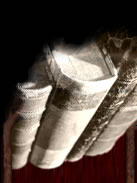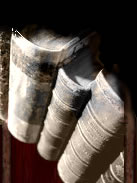
I was born in New York's Hudson River Valley, in the city of Peekskill, during
the so-called "baby boom". Peekskill is also the birthplace of Mel Gibson,
PeeWee Herman, and one of the first nuclear reactors in the US. The Gibsons
moved to Australia shortly after Mel was born. PeeWee and I just kept on
drinking that supercharged water.
You may draw your own conclusions from this.
Family legends confirm that I've been a storyteller pretty much from the moment
I learned to talk. I quickly learned that character, pacing and plot were
important to any work of fiction, but that nothing was more important than
believability. Parents cannot be convinced that there are monsters under the
bed, but they will spend hours looking for mice or squirrels.
I discovered my father's typewriter long before I learned to read and decided
that any machine which had so many moving parts and made such amazing noises was
going to be a major part of my life. I've been an only child most of my life and
filled my world with imaginary friends.
I didn't play with them.
I watched them play with each other, then I wrote about them. I kept this up
until I got to college, the University of Rochester, class of 1969, where the
real world was, at long last, more interesting than anything I could imagine. At
first I majored in hard science- astrophysics- but migrated to the humanities
because they understood that life did not begin until noon and never scheduled
8AM organic chemistry labs. I'd gotten two degrees in European history and was
well on my way to my Ph.D. when my advisor pointed out that, given the natural
rise and fall of demographic curves, tenured university faculty positions were
going to be as scarce as hen's teeth for the next twenty-five years and my
education was turning into an expensive hobby. (He was right, too.)
He suggested I get myself a real job, so I became a computer programmer, which
in those days (after dinosaurs, before IBM 360's) was a wide-open hands-on
field. Companies were eagerly hiring warm bodies to computerize decades, even
centuries, of handwritten data.
I vanished into the dusty archives of a huge insurance company and might have
remained there forever, but fate - masquerading as the New York City Bankruptcy
Crisis of 1976 - intervened. The powers that were, in recognition for my
tolerance of dust, silverfish, and the occasional mouse, made me the least
significant member of the state taskforce charged with deciphering the city's
arcane pension funds. My job: take a forklift full of key- punched cards
(representing a quarter century of police, fire, and sanitation force records
which had been stashed in leaky closets all over City Hall) and load them onto
"modern" magnetic tape! (Deleting, of course, the ones the mice,
roaches, and whatnot had mangled beyond all electronic interpretation.) When I
was finished, senior members of the task force would prove actuarially what
everyone already knew intuitively: there was no earthly way New York City could
meet its obligations.
Throughout that long winter and spring, while decoding one ancient algorithm
after another, I contemplated life in the Big Apple without police, without
firefighters and, especially, without garbage collection. The state did
eventually decide to bail the city out; I decided to bail out of the city.
I headed west. I got to Ann Arbor, Michigan, where bagels were fresh, lox was
airlifted daily, and the sky was frequently blue and rarely green.
Still, it took one more major turn of events to get me back to my childhood
dreams. In January of 1977 I headed for the airport to fetch Gordon Dickson back
to Ann Arbor for the annual science fiction convention. (My Ann Arbor
acquaintances being old-time SF readers and convention-goers.) The temperature
hadn't seen the plus side of zero degrees Fahrenheit for a week and the brake
cylinders on my old New York car finally said "enough". They gave up the ghost
on the airport access road. I came to in an emergency room. The less said about
the balance of that afternoon, the better.
Except that Gordie felt guilty: Someone he didn't know from Adam had very nearly
made the ultimate sacrifice to get him to the convention on time. I guess he
felt a karmic need to make a sacrifice in return: He offered to read such prose
as I could manage to produce. It was an offer that I could not refuse. Propped
up by pillows and crutches, and still suffering the hallucinations of a
fractured skull, I began Daughter of the Bright Moon.
Poor Gordie. He later confessed that I was, beyond doubt, the least-promising
would-be writer ever to cross his bows. He swears he did his best to discourage
me, and that he wasn't at all subtle, but I never got the message. I'd been
given a once-in-a-lifetime opportunity to become what I'd always dreamed of
being and a simple thing like a style charitably described as "academically
turgid" wasn't going to get in my way.
Fortunately for me, by the time I was rid of my crutches and Gordie might have
considered his karmic debt fully repaid, with interest, I'd taken his blunt
lessons to heart and tried to incorporate them into Daughter. Gordie sat back
after what must have been the ninth or tenth rewrite of chapter one and said,
with a look of astonishment, that it was good and I should start chapter two.
The rest, one might say, is history. A year after my accident, with Daughter
finished but advisedly left behind, Gordie squired me through the editorial
gauntlet at the 1978 Boscon. I was initiated into the ranks of
soon-to-be-published writers and never looked back.
There've been many ups and downs since 1978. Any creative lifestyle can be
categorized as "life without any visible means of support". I married
Bob Asprin and spent most of the 1980's as a step-mother, a role which,
especially for a fantasy writer, comes with a whole lot of emotional baggage.
Since I started, I've written thirteen novels. I also wrote for and eventually
wound up co-editing the Thieves' World shared-world anthology series
which ran for twelve volumes before going on hiatus. Courtesy of TW, I've been
invited into other shared-world anthologies, often in exchange for the
"inside scoop" on how I handled story continuity, not to mention egos
and deadlines.
In 1993, during the throes of a prolonged but ultimately amicable divorce from
Bob, C.J. Cherryh suggested that when the dust cleared I might relocate to
Oklahoma City (where the locals had a lot of experience with dust and which, she
assured me, was not outside the known universe). I first crossed the Mississippi
with great trepidation, expecting all my Hudson River-based mitochondria to rise
up in revolt, but they adapted to the change in water and I made the move in
January of 1994, when, for the first time since 1977, we went two weeks without
seeing the plus side of zero on the thermometer. But negative numbers seemed
felicitous for me.
BENEATH THE WEB, the sequel to the Wooden Sword was well-received when it
was published in August of 1994. My second DarkSun novel, Cinnabar
Shadows was published by TSR in July of 1995. I thought things were looking
up, but I forgot that while fiction, even fantasy fiction, must be more
believable than fact, the business of fiction knows no limit to the word
"strange". Although ACE Books bought my trilogy, Siege of
Shadows, they opted to publish only one volume of it in 1996, a decision
which led them to re-consider our long-term relationship and me to consider a
lot more than that.
I've continued writing for TSR since its acquisition by Wizards of the Coast;
producing pulp fiction is an honorable trade and the place where many lifelong
readers get their start. I've also joined forces with a new publisher, DAW
Books, where the editors seem to like the very aspects of my fiction, which
irritated ACE so much. My first DAW Book, Jerlayne, hit the stands in March
1999; I'm hoping it's the first of many. I'm still working with ACE, though
"another example of hope trumping experience"? and will have a series
of "modern-day witchcraft with historical overtones" coming out from
them starting in 2000.
With all those changes, it seemed time to leave Oklahoma, too. My sense of
direction still leaves something to be desired. In 1997, I got my mitochondria
back to the eastern side of the Mississippi, but I turned right instead of left
in Memphis and wound up in central Florida where the temperatures rarely dip
below freezing. I've adapted, though; I leave my windows open in December and
sometimes it almost feels like winter. My computer takes up a good chunk of the
living room; embroidery and books fill the rest. My cat is happy. What more
could a writer want?

Homepage: LynnAbbey.com





A special 'Thank you' goes to WotC, Inc.
I copied the bio from their database.
|





